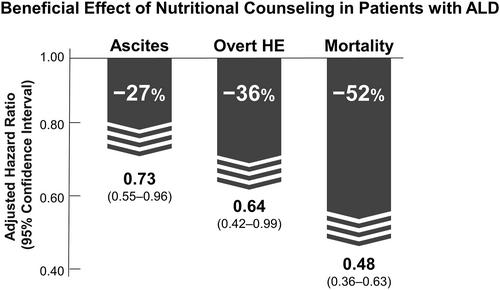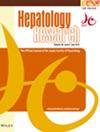Nutritional counseling improves mortality and prevents hepatic encephalopathy in patients with alcohol-associated liver disease
Abstract
Aim
Nutritional counseling improves malnutrition, which determines the prognosis of patients with chronic liver disease. In this study, we investigated the effects of nutritional counseling on mortality and the risk of overt hepatic encephalopathy (HE) in patients with alcohol-associated liver disease.
Methods
In this retrospective cohort study, we included 211 patients with alcohol-associated liver disease who visited Gifu University Hospital between August 2008 and June 2023. Patients were classified into two groups according to the frequency of nutritional counseling by a registered dietitian. The primary outcomes were all-cause mortality and overt HE. Propensity score matching analysis was performed to adjust for potential confounders.
Results
Among the patients (median age 67 years; 88% men; and median Model for End-Stage Liver Disease score, 9), 86 (39%) were in the high-frequency (≥2) nutritional counseling group. The high-frequency group had a significantly higher survival rate (46% vs. 25%) and a lower incidence of overt HE (16% vs. 27%) at 5 years than the low-frequency group. Nutritional counseling was associated with a reduced risk of mortality (hazard ratio [HR] 0.48; 95% confidence interval [CI] 0.36–0.63) and overt HE (HR 0.64; 95% CI 0.42–0.99), independent of hepatocellular carcinoma and liver function reserve. After propensity score matching, nutritional counseling was still associated with a reduced risk of mortality (HR 0.34; 95% CI 0.19–0.59) and overt HE (HR 0.31; 95% CI 0.11–0.87).
Conclusions
Nutritional counseling effectively improves mortality and prevents overt HE in patients with alcohol-associated liver disease, thereby proving essential for the management of these patients.


 求助内容:
求助内容: 应助结果提醒方式:
应助结果提醒方式:


